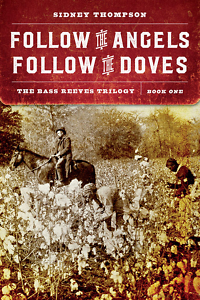Midway through Follow the Angels, Follow the Doves, the first novel by Memphis native Sidney Thompson, an early battle of the Civil War rages on the western front in Arkansas, where an enslaved man named Bass has been ordered to attend his master, George Reeves, an officer fighting for the Confederate Army of the West. Unlike most slaves, who were forbidden to shoot guns, Bass is a skilled sharpshooter, having garnered cash prizes at turkey shoots throughout the South for his previous master, George Reeves’ father.

As other slaves reload muskets for their officer-masters to use during an ill-planned attack, Bass and George switch roles. Although George is a capricious and often cruel man, he knows his best chance for survival lies in the skill of Bass, who — though he’s never before fired at a human being — drops one Yankee after another by aiming at the brass buttons of their coats.
“Bass hated to watch men fall,” Thompson writes, “to stand idly by and watch a man’s full collapse.” Yet such moments, played out thousands of times throughout the course of the long and bloody war, shaped many of the hard men who would become both the famous outlaws and celebrated lawmen of the American West. The historical Bass Reeves became one of the latter. He was the first African American to be named a deputy U.S. marshal. By the time he retired after 32 years of service, he would claim to have arrested more than 3,000 criminals and to have killed 14 desperadoes in self-defense, a record never matched. Because he killed so few of those he tracked, shot so accurately, and often worked with Native Americans, some historians believe that Reeves was the model for the fictional Lone Ranger.
Follow the Angels, Follow the Doves is the first installment of a planned trilogy. The title comes from a spiritual Bass sings at tense moments, “Praying for That Heaven Place.” Unlike many of the historical touches employed throughout the book, the song is pure fiction. With it, as in many reflective moments within the story, Thompson displays the lyrical ability seen in his poetry chapbook You/Wee: Poems from a Father. He deftly depicts his protagonist, creating a believable coming-of-age story that echoes Huckleberry Finn in its realism and social observation.
 It also echoes Twain’s masterpiece in its use of a particularly offensive epithet. As Thompson, who teaches writing and African American literature at Texas Christian University, explains to readers in an apology of sorts at the front of the book, he abhors the word’s “casual and slanderous use” but includes it, printed as n‑‑‑‑, because his “responsibility as a writer of historical fictions is to recreate the past as I see and feel it. Because I want readers to experience the violence, repression, inhumanity, and hate of nineteenth-century America for its teachable lessons.”
It also echoes Twain’s masterpiece in its use of a particularly offensive epithet. As Thompson, who teaches writing and African American literature at Texas Christian University, explains to readers in an apology of sorts at the front of the book, he abhors the word’s “casual and slanderous use” but includes it, printed as n‑‑‑‑, because his “responsibility as a writer of historical fictions is to recreate the past as I see and feel it. Because I want readers to experience the violence, repression, inhumanity, and hate of nineteenth-century America for its teachable lessons.”
The Bass of the novel is born within such repression but doesn’t experience its full violence until the age of 22, when on the eve of war his master, a usually gentle old man, suddenly gives Bass to his son. George Reeves’ behavior is mercurial, wavering from sadism and brutality to an offer of whiskey and poker in the master’s library. Whether being kind or vile, he quotes Melville, Longfellow, and other literature in place of conversation. During one of his kinder sessions, George turns to Bass in the library and laughingly suggests they should trade places.
Bass laughed with him. And I’d be the hardest-cracking cracker this world’s ever seen, he vowed to himself, sipping his rye and this time wanting to, contemplating what cracking like a cracker king would look or sound like — if it’d feel like everything good he’d ever felt at once or if he’d rise above feeling altogether, just a shell with a queer metallic song.
In such moments, the enslaved man envisions a path to freedom. When the elder Reeves and Bass’ aged grandfather, called Old Bass, surprise him between battles, the older master greets him warmly, calling him by his first name. “It seemed to Bass that they were becoming something,” Thompson writes, “but Bass hadn’t the word for it — not friends and not family. A third thing somewhere in between.”
Bass finds that third thing in unlikely places. Among the fiercest soldiers he observes in combat are a group of Cherokees in what was known as Pike’s Indian Brigade. Bass is able to impress and speak closely with some of these warriors, an act that will prove useful in his future life. Eventually he takes the fateful step toward that life, which is sure to become more complex — if no less violent — through the remainder of the trilogy.

Michael Ray Taylor’s book Hidden Nature, a mixture of memoir and subterranean natural history, will be published in July 2020. He chairs the communication and theatre arts department at Henderson State University in Arkadelphia, Arkansas.
Tagged: Book Reviews





